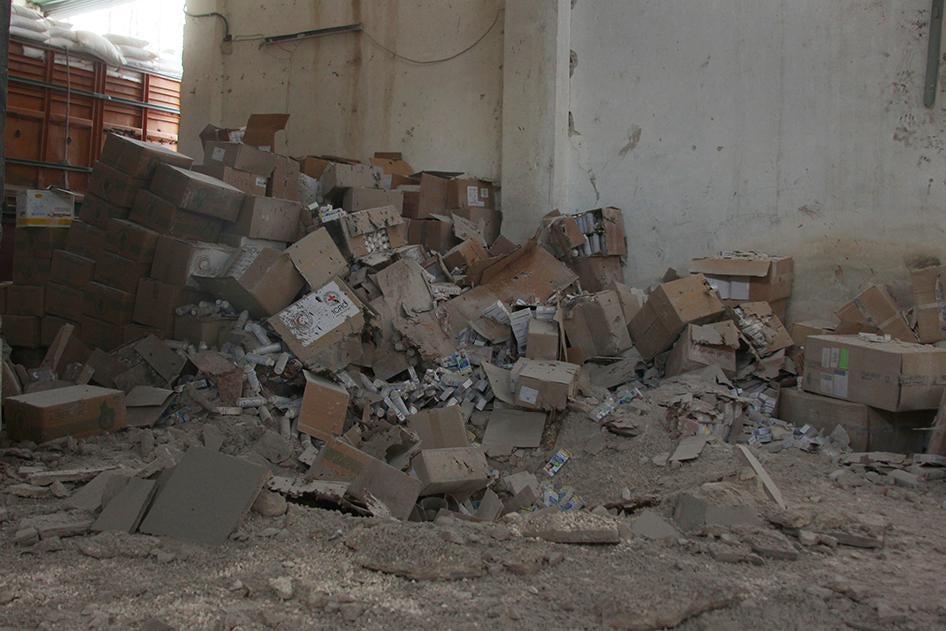Last fall, a 31-truck United Nations convoy laden with wheat flour, health supplies, and emergency aid left Syrian government-controlled western Aleppo bound for thousands of civilians in the opposition-held countryside. UN banners hung from the front and sides of each truck. After extensive negotiations, Syria’s government approved the aid convoy, its movements coordinated at every step. Its progress was even monitored by a Russian drone.
Still, the aid never reached the people in need.
Instead, while en route, masked armed men looted three of the trucks. Then, the convoy was bombed, killing aid workers and other civilians. Among them was Omar Barakat, the Syrian Arab Red Crescent’s director in Urum al-Kubra, where the bombs struck. When a humanitarian warehouse where the convoy was unloading was hit, most of the convoy’s supplies were damaged or destroyed.
Immediately after the attack, Human Rights Watch reviewed photos showing injured and dead civilians, fires engulfing buildings, and people holding damaged supplies emblazoned with Syrian Red Crescent and UN agency logos. Our researchers talked with survivors who reported seeing aircraft and concluded that, since only Syrian or Russian air forces were operating in the area at the time, only they could be responsible for the attack. In December 2016, the public summary of a UN report by a special board of inquiry confirmed those findings.
Despite the international outrage generated by the attack, there has been a shocking lack of follow-up on the December report’s findings. This lack of action sends states the message that you can bomb an UN aid convoy – even one that’s been approved – and get away with it.
The UN report debunks the Russian government’s claims that the incident was a hoax or an attack by opposition groups from the ground. It makes clear that the aid workers were attacked “from the air.” The UN investigators also conclude that the attackers used multiple types of munitions deployed from more than one type of aircraft, including “non-precision” bombs or incendiary weapons, or both. It also says that armed opposition groups don’t fly planes and that it’s “highly unlikely” that the United States-led coalition carried out the attack. While the board didn’t publicly identify a perpetrator, process of elimination points to the Syrians or the Russians as the only options.
Deliberate or indiscriminate attacks on humanitarian workers and vehicles are serious violations of international humanitarian law – and even if the board did not have enough evidence to conclude they were deliberate, they certainly were indiscriminate. When committed with criminal intent – that is willfully or “recklessly,” those responsible have committee war crimes.
On the day of the attack, the UN under-secretary general for humanitarian affairs called for an investigation, saying that, “the perpetrators should know that they will one day be held accountable for violations of international humanitarian and human rights law.” Now that the investigation is complete, it’s up to the UN Security Council to act.
Sweden just joined the Security Council and is lead on Syria’s humanitarian situation. It should use one of the two meetings on Syria scheduled this month before it relinquishes the rotating presidency at the end of the month to ask the new secretary-general to present the board’s full report to the Security Council.
Once they have all the facts, council members should put the Syrian government and permanent Security Council member Russia on the spot, demanding they respond to the evidence as to which of them was responsible for the attack. Accountability needs to begin somewhere.










